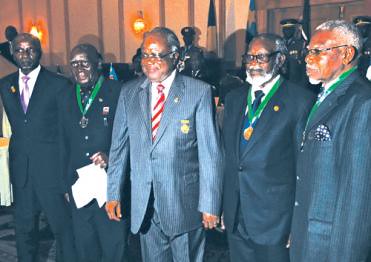
SADC Summit ends on high note in the capital of Windhoek, Namibia on August 17, 2010. The Summit called upon western states to lift sanctions against Zimbabwe., a photo by Pan-African News Wire File Photos on Flickr.
Is this the resurgence of pan-Africanism in Sadc?
Tuesday, 23 August 2011 02:00
Tendai Moyo
The regional grouping has apparently assumed a vigilant stance that is aimed at thwarting any external meddling into its business, particularly by the imperial and intrusive western bloc.
Resistance to western interference weather by proxy or direct was clearly witnessed during the 2011 Windhoek Sadc summit where the host Namibian police procedurally blocked mischievous attempts by the western controlled civic organisations to misrepresent the Zimbabwean story for the benefit of the regime change agenda.
It had become a perennial habit for these well funded and foreign driven organisations to besiege regional venues where they will frantically seek to vilify Zimbabwe and its leadership so as to willfully influence the outcomes in favour of well-known western positions.
Previously, the regional bloc was easily hoodwinked by these western mercenaries and some of the resolutions, particularly the Livingstone 2011 communiqué, were moulded along the lines of addressing positions delivered by these organisations to the summit.
It is purely against this backdrop that we applaud actions by the Namibian police to contain treacherous actions by these merchants of imperialism and, from that, we start to glean a deliberate strategy by regional countries to tackle western interference into its business.
Similar combative actions were recently replicated in Angola, where these western extensions were once again stopped in their tracks of seeking to promote foreign interests at the regional forum.
During the build up to the Luanda Summit, Angolan authorities using pan-African vigilance, either denied visas or deported leaders of civic groups who had travelled for the Southern Africa Civil Society Forum, which they held annually on the sidelines of the Sadc Heads of State Summit.
This marked the resurgence of the pan-African parties that inherently frowns at anything imperial.
Although it bruised the ego of the omnipotent western donors, the message was clear and forceful. The region no longer condones imported agendas.
Even the patently foreign-funded parties in Zimbabwe's makeshift government were not invited to partake on regional business during the recently concluded Luanda summit.
Interestingly, the summit decided to review its over-dependence on foreign funding amid reports that 63 percent of its 2011 budget was exclusively being funded by donors who largely hail from the hegemonic West.
In their pan-African wisdom, maybe rekindled by the Libyan debacle, the regional leaders found it clearly untenable that the their regional grouping should rely on foreign alms for its operations.
The financial position of the regional body gained prominence at the summit because of inauspicious events in one of its member countries, Malawi, where the folly of over-dependency on donor funds is currently being unravelled.
Unlike the regional body which is sponsored to the tune of 63 percent Malawi's budget receives 40 percent support from donors yet it is now experiencing the excruciating pangs of financially relying on foreign countries.
The UK withdrew aid worth US$550 million for Malawi on 2 June 2011 after the government deported a British envoy who criticised president Bingu Wa Mutharika in a leaked memorandum.
In a gesture of imperial camaraderie, the US also went on to suspend US$350,7 million aid to the Southern African country.
As a result, the country is now suffering from acute foreign currency and fuel shortages that have been precipitated by the punitive actions of its donors.
Their central bank recently announced that it has devalued the Malawian Kwacha by 10 percent, which analyst say was not adequate, showing that the country was now gradually limping towards an economic implosion as the donors start to diligently pull strings attached to their money.
Maybe the old adage that once bitten twice shy could also explain Sadc's current bid to immediately drop the begging bowl.
The regional body previously experienced the negative effects of largely relying on foreign funding when donors for its now moribund tribunal eventually hijacked the court to protect their interests in the region.
Nevertheless, the resurgence of pan-Africanism straddles beyond the regional body as some countries in their own capacity, as sovereign states, have made decisions that challenges imperial designs by the West.
Recently, South Africa made a brave pronouncement that it was going to accept diamonds from Zimbabwe's Marange diamond fields despite fervent opposition from the West, which is spearheading a blockade on these gems. The move compelled the US to immediately dispatch its Assistant Secretary for Economic, Energy and Business Affairs Jose Fernandez to South Africa to try and arm twist it into abandoning its policy on Marange diamonds.
This representation was frankly rejected as South Africa, under the spirit of pan-Africanism, unequivocally told the world superpower that it was standing by its decision to support Zimbabwe.
Similarly, the African Diamond Producers Association (ADPA), under the same spirit, also rallied behind Zimbabwe saying that its Marange gems should be allowed to be freely traded on the international market.
In South Africa and Namibia, there is also growing talk about land redistribution, with the former experiencing increasing calls by the ANC Youth League and Cosatu for the nationalisation of mines.
These calls are a constant threat to white capital, which the west militantly seeks to protect at any cost.
It can therefore be deduced from these regional developments that there is a gradual resurgence of the pan-African spirit within Sadc, which is set to challenge unwarranted meddling by the West into its affairs or the affairs of its member countries.
--The writer can be contacted on tindo2m-oyo.gmail.com
No comments:
Post a Comment